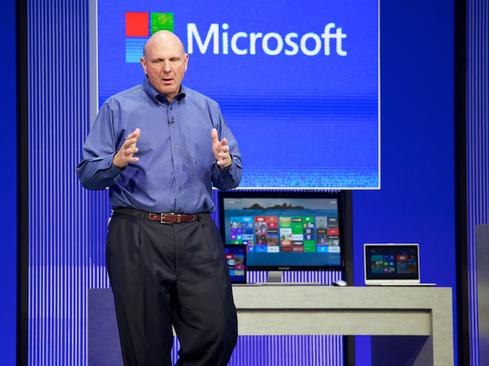Microsoft CEO Search: Ericsson's Vestberg A ContenderMicrosoft CEO Search: Ericsson's Vestberg A Contender
As Microsoft works to replace Steve Ballmer, Ericsson CEO Hans Vestberg reportedly lands on the short list.

Ericsson CEO Hans Vestberg is reportedly on the shortlist of candidates who could succeed Steve Ballmer as Microsoft CEO.
Microsoft director John Thompson said in December that Microsoft began its search with more than 100 candidates and would name a new CEO by early this year. Ford CEO Alan Mulally had been seen as a leading contender but removed himself from consideration earlier this month. According to Bloomberg, which cited unnamed sources with knowledge of the search process, Microsoft's board is now considering Vestberg among a handful of other candidates, including Microsoft cloud leader Satya Nadella and former Nokia CEO Stephen Elop.
Vestberg joined Ericsson in 1988 and has served as the telecom equipment-maker's CEO since 2010. The company's share price and revenue have both been up during the 48-year-old's tenure, which has included the termination of the Sony Ericsson handset partnership. Last fall, Ericsson acquired Microsoft's Mediaroom IPTV platform, which powers television services such as AT&T's U-verse.
[Microsoft moves to bolster its customer relationship management software. Read Microsoft Parature Buy: Think Self-Service CRM.]
Citing sources close to Microsoft, Reuters reported Thursday that with Mulally out, the company's board faces a slim list of candidates qualified to take on Microsoft's most pressing challenges -- namely, managing its massive scale while also addressing its weak mobile presence.
Quoting an unnamed person with knowledge of the matter, Bloomberg stated that Mulally wasn't confident Ballmer and Microsoft chairman Bill Gates would give the next CEO enough flexibility to execute new strategies. The report reflects ongoing speculation that power struggles are unfolding behind the scenes of Microsoft's search.
Microsoft has declined to comment on various CEO rumors, but Thompson has indicated the board intends to follow the blueprint Ballmer has laid out. But Microsoft's shareholders have always had a contentious relationship with Ballmer, even as the company remains enormously profitable. Motivated by the cool reception to Windows 8 and Microsoft's Surface tablets, some influential investors have reportedly charged that Gates and Ballmer are wielding too much influence over the CEO selection process.
Subsequent reports have reiterated that some CEO candidates have been discouraged by the constraints they perceive they'd face at Microsoft. Regardless of whether Gates and Ballmer are actually advocating certain strategies behind closed doors, it's easy to see why new candidates might be cautious: Gates and Ballmer are the only two CEOs in Microsoft's history, both sit on the company's board, and they control more company stock than any other pair of individual shareholders.
Candidates' specific concerns haven't been made public, but analysts frequently debate a number of ongoing Microsoft strategies: whether it should make its own devices; whether it should sell off the Xbox; whether it should focus on enterprise software; whether Microsoft stymies innovation by protecting existing revenue streams; whether it should release Office for the iPad; and so on.
Recent reports about Windows 9 only add to this line of intrigue. The rumored return of the Start menu and other alleged features suggest Microsoft might be backtracking on at least some of its previous plans, and that new leadership might be asserting itself within the Windows division.
Microsoft will report quarterly earnings on January 23, which should provide some insight into how the company's restructuring effort is proceeding, and whether holiday sales propped up Windows 8 or the Surface line.
Michael Endler joined information as an associate editor in 2012. He graduated from Stanford in 2005 and previously worked in talent representation, as a freelance copywriter and photojournalist, and as a teacher.
Incidents of mobile malware are way up, researchers say, and 78% of respondents worry about lost or stolen devices. But though many teams are taking mobile security more seriously, 42% still skip scanning completely, and just 39% have MDM systems in place. Find out more in the State Of Mobile Security report (free registration required).
About the Author
You May Also Like






